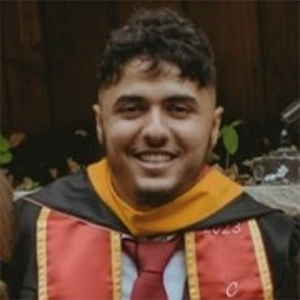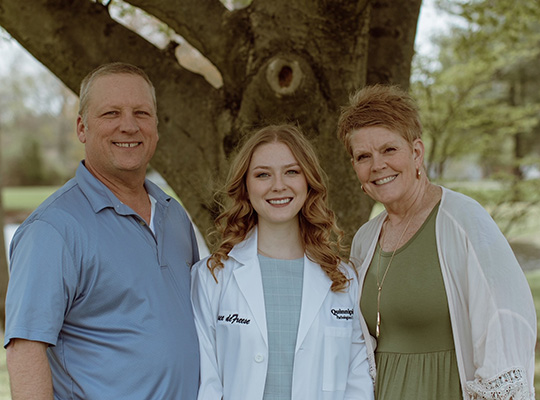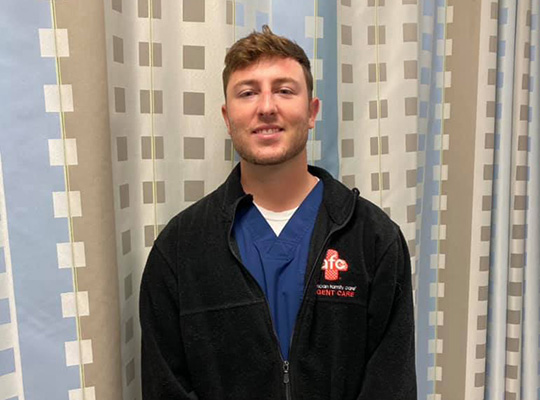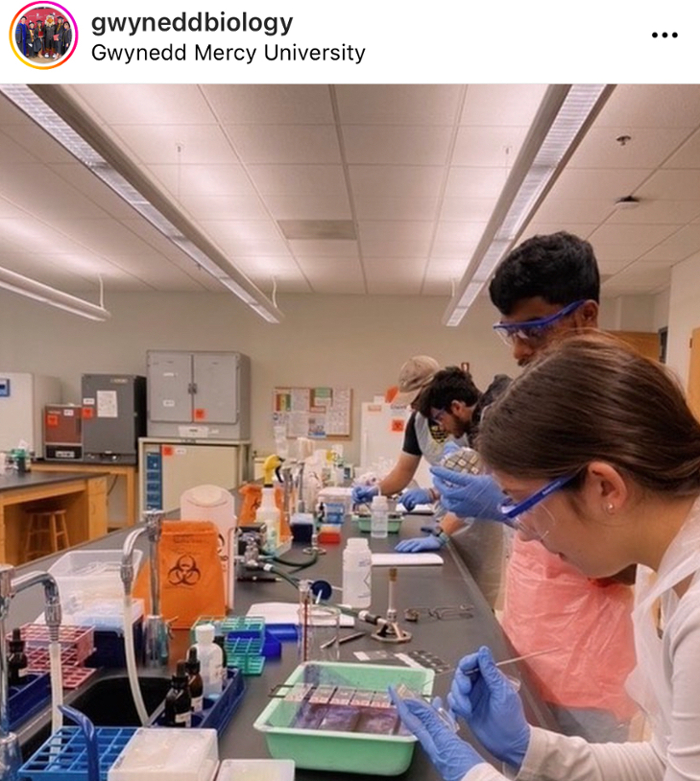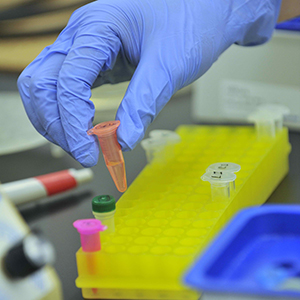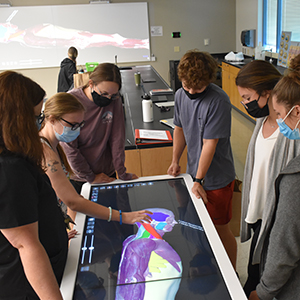Biology Major: Bachelor of Science Degree in Biology
Majoring in Biology at GMercyU can lead to direct entry into a well-paid, in-demand career in the sciences, such as those in the local pharmaceutical industry hub.
The program is also the perfect preparation for graduate school or medical school.
Love science but unsure what career path to pursue? Our program will help you discover the right one for you.
-
100%
of 2025 Biology grads were employed in the field or enrolled in a graduate program within two months
-
100%
of Biology majors complete independent research and an undergraduate thesis
-
93%
of Biology's required courses (13 out of 14 courses) feature a lab
-
Top 20%
nationally ranked on the molecular biology and genetics component of the ETS Major Field Test in Biology (2025)*
-
100%
of full-time undergraduate GMercyU students receive some form of financial aid (excludes second degrees)
*Students ranked in the top 27% for overall ETS score.
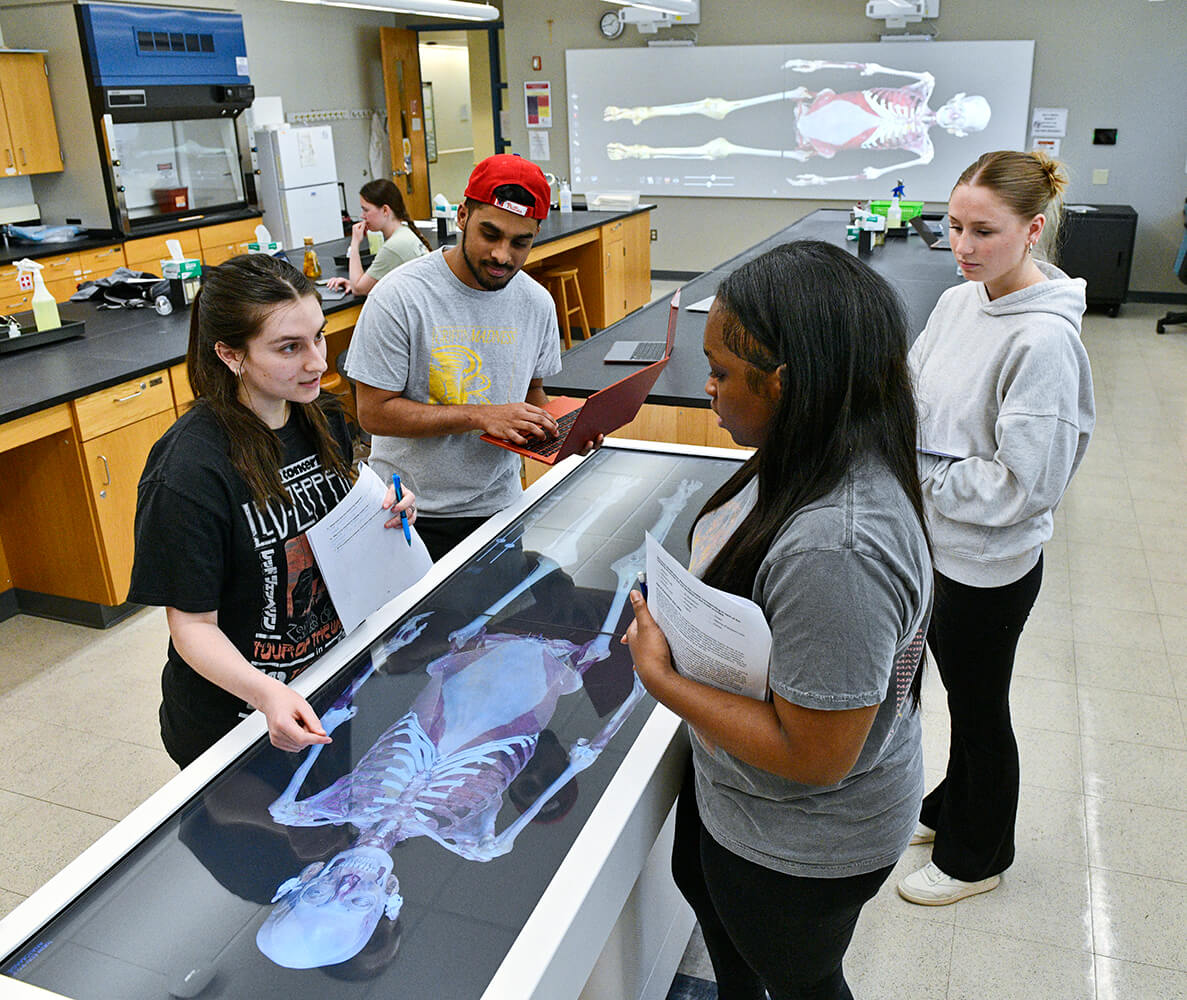 What Sets Us Apart
What Sets Us Apart
GMercyU's Biology program features an emphasis on molecular and cellular biology, genetics, and biochemistry.
Highlights include:
- Automatically earn a Chemistry minor with your degree. (Many students choose to earn a Microbiology minor, as well.)
- State-of-the-art labs, including an Anatomage Table, a life-size 3D anatomy visualization and virtual dissection table that offers an interactive look at the human body, animals, and clinical cases
- Small classes with GMercyU’s low 10:1 student-to-faculty ratio
- Experienced faculty members with doctoral degrees – no teaching assistants (TAs), which you may find at other schools. This means richer learning opportunities and closer mentoring relationships.
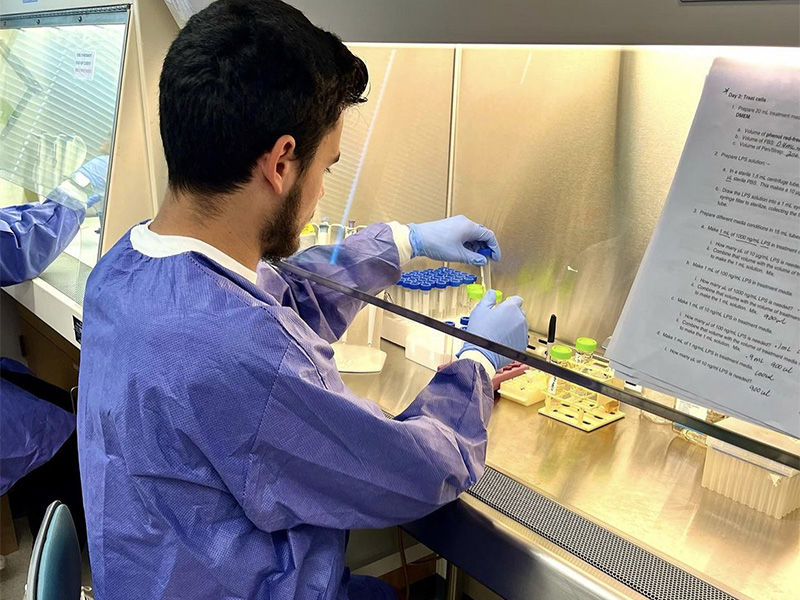 Almost every required Biology course has a laboratory component, because the best way to learn is with hands-on experience guided by faculty experts. You'll use current technology that is applicable to graduate research and is in demand by biotechnology and pharmaceutical companies.
Almost every required Biology course has a laboratory component, because the best way to learn is with hands-on experience guided by faculty experts. You'll use current technology that is applicable to graduate research and is in demand by biotechnology and pharmaceutical companies.
Laboratories feature modern instrumentation and facilities for biology and chemistry: thermal cyclers, electrophoresis equipment, a research room with tissue culture hoods used for work in cell culture, and more.
And, all Biology majors are required to complete a research experience. You'll have opportunities to present your research and contribute to publications, under the mentorship of experienced faculty. See what our Biology majors presented at our annual University Research Conference!
These practical, hands-on research opportunities give GMercyU biology students an edge in their job searches and graduate school applications.
In addition to general education course requirements, our bachelor of science in biology students will complete the following courses:
Major Requirements – 57 Credits
| BIO 203/203L | General Biology I/Laboratory |
| BIO 204/204L | General Biology II/Laboratory |
| BIO 230/230L | Ecology / Laboratory |
| BIO 251/251L | Genetics/Laboratory |
| BIO 402/402L | Molecular Biology of Cell/Laboratory |
| BIO 415/415L | Developmental Biology/Laboratory |
| BIO 421 | Biology Research (may be satisfied by BIO 440 - Internship) |
| BIO | Biology Elective |
| BIO | Biology Elective |
| BIO | Biology Elective |
| BIO | Biology Seminar I- Capstone |
| CHM 151/151L | Principles of Chemistry I / Laboratory |
| CHM 152/152L | Organic Chemistry I / Laboratory |
| CHM 203/203L | Organic Chemistry II / Laboratory |
| CHM 204/204L | Biochemistry I / Laboratory |
| CHM 301/301L | Biochemistry II |
| CHM 302 | General Physics I / Laboratory |
| PHY 241/241L | General Physics II / Laboratory |
| MTH 234 | Probability and Statistics |
| MTH 245 | Calculus |
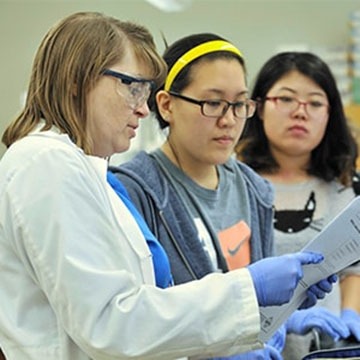
Michelle McEliece, PhD
Position: Professor, Program Director
Did You Know? Dr. McEliece served as a post-doctoral fellow at Fox Chase Cancer Center.
Read bio
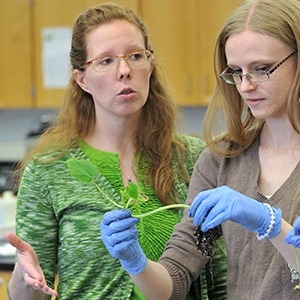
Stacey Lettini, PhD
Position: Professor
Did You Know? Dr. Lettini’s research interests include the ecology and energetics of host-parasite relationships.
Read bio

Clesson Higashi, PhD
Position: Assistant Professor
Did You Know? Dr. Higashi is broadly interested in host-microbe interactions, with a specific focus on heritable endosymbiotic microorganisms. He enjoys mentoring junior researchers.
Read bio
Program Options
As a Biology major, you could choose one of these specific paths if they suit your career goals.
This track features the specific coursework recommended for those interested in becoming a dentist. Our Pre-Professional Advising Office is ready to help you with your dental school applications and preparing for the Dental Admission Test (DAT).
Declare this track at the beginning of your sophomore year or at any point until senior year, so long as you've taken the appropriate designated courses. Learn more here.
This track features the specific coursework recommended for those interested in medicine, to prepare you for the MCAT and medical school admission. Our Pre-Professional Advising Office is also ready to help you with your medical school applications and preparing for the MCAT exam.
You can declare this track at the beginning of your sophomore year or at any point until senior year, so long as you've taken the appropriate designated courses. Learn more here.
This track features the required coursework for those who want to apply to a physical therapy program.
Declare this track at the beginning of your sophomore year or at any point until senior year, so long as you've taken the appropriate designated courses. Learn more here.
Did you know? The job growth for physical therapists is expected to increase by 14% through 2033, more than three times the national average.
With the job growth for PAs expected to increase by 28% through 2033 (seven times the national average), now is a great time to pursue becoming a PA. It also requires less time and tuition than traditional medical school.
GMercyU's Pre-PA Track features the required coursework for students interested in PA school. Declare this track at the beginning of your sophomore year or at any point until senior year, so long as you've taken the appropriate designated courses. Learn more here.
Earn a biology degree and master's degree in education in just five years
Want to teach biology in a secondary school setting? With this unique 4+1 MsEd degree option, you can take graduate level courses during your senior year– as part of your undergraduate tuition. This prepares you for your fifth year, where you will complete your MsEd degree with online courses and a student teaching requirement. This degree offers a path to certification.
*Certification: This program was designed to meet the certification requirements of the Commonwealth of Pennsylvania. If you reside in a different state, you should carefully review your home state’s certification requirements prior to enrolling in this program.
Earn a Two-Year Degree in Natural Science
The Natural Science degree is a two-year program designed for students wishing to gain a foundation in scientific theory and practice. Students who earn their Associate of Science Degree will qualify for entry-level employment or continued education toward the baccalaureate degree. The degree is ideal for part-time students already working in the science field who are looking to advance in their current position. The program is closely aligned with the first two years of the Bachelor of Science Degree in Biology, making the transition from the AS to BS degree seamless.
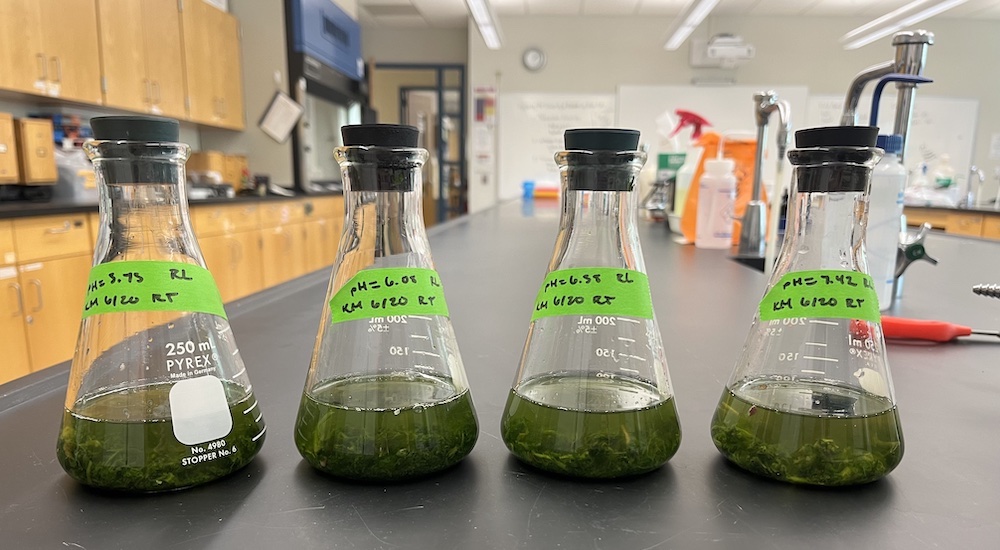
Internship Opportunities
Many GMercyU biology majors satisfy their required research experience by conducting research with an on-campus internship under the direction and mentorship of program faculty.
You can also opt to complete your research at a summer internship off-campus.
Organizations where students have recently interned:
- M.D. Anderson Cancer Center
- Children's Hospital of Philadelphia (CHOP)
- Colorcon
- Drexel University
- Emerson Resources, Inc.
- GlaxoSmithKline
- Johnson & Johnson
- Merck
- Novartis Pharmaceuticals
- Philadelphia Zoological Garden
- QC Laboratories
- Thomas Jefferson University
- Vanderbilt University
- Wissahickon Water Shed
GMercyU Biology Graduate Destinations
58% joined the workforce immediately after graduation
29% were accepted into a graduate program (for a master's degree, doctorate, or physician assistant school)
9% were accepted into a professional school, such as medical school, dental school, or veterinary school
4% went into teaching
(per data from the last 10 years)
Careers in the sciences are essentially recession-proof. There is always a need for innovation and progress.
—Michelle McEliece, PhD, Program Coordinator
Scholarships
GMercyU offers dozens of scholarships and grants to help you get a great education at an affordable cost. They do not need to be repaid and generally are renewable each year.
Transfer to the Program
GMercyU grants up to 90 qualifying credits toward a bachelor's degree and offers renewable transfer scholarships and grants ranging from $11,000 to $21,000 a year.

